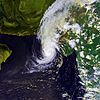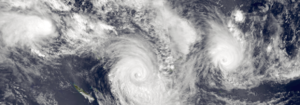Portal:Tropical cyclones
Portal:Tropical cyclones
Jump to navigation
Jump to search
Portal maintenance status: (June 2018)
Please take care when editing, especially if using automated editing software, and seek consensus before making major changes. Learn how to update the maintenance information here. |
Tropical cyclones portal
.mw-parser-output .module-shortcutboxplain{float:right;border:1px solid #aaa;background:#fff;margin:0 0 0 1em;padding:.3em .6em .2em .6em;text-align:center;font-size:85%;font-weight:bold}.mw-parser-output .module-shortcutlist{display:inline-block;border-bottom:1px solid #aaa;margin-bottom:.2em;font-weight:normal}.mw-parser-output .module-shortcutanchordiv{position:relative;top:-3em}

A tropical cyclone is a storm system characterized by a large low-pressure center, a closed low-level circulation, and a spiral arrangement of numerous thunderstorms that produce strong winds and heavy rainfall. Tropical cyclones feed on the heat released when moist air rises, resulting in condensation of water vapor contained in the moist air. They are fuelled by a different heat mechanism than other cyclonic windstorms such as nor'easters, European windstorms, and polar lows, leading to their classification as 'warm core' storm systems. Most tropical cyclones originate in the doldrums near the Equator, approximately 10 degrees away.
The term 'tropical' refers to both the geographic origin of these systems, which form almost exclusively in tropical regions of the globe, and their formation in maritime tropical air masses. The term 'cyclone' refers to such storms' cyclonic nature, with anticlockwise rotation in the Northern Hemisphere and clockwise rotation in the Southern Hemisphere. Depending on its location and intensity, a tropical cyclone can be referred to by names such as 'hurricane', 'typhoon', 'tropical storm', 'cyclonic storm', 'tropical depression', or simply 'cyclone'.
- Pictured: Typhoon Tip
Purge cache to show recent changes
Selected article

Hurricane Mitch was one of the most powerful hurricanes ever observed, with maximum sustained winds of 180 mph (290 km/h). The storm was the thirteenth tropical storm, ninth hurricane, and third major hurricane of the 1998 Atlantic hurricane season. At the time, Mitch was the strongest hurricane ever observed in the Atlantic Ocean in the month of October, though it has since been surpassed by Hurricane Wilma of the 2005 season. Mitch formed in the western Caribbean Sea, eventually reaching Category 5 status on the Saffir-Simpson Hurricane Scale. It remained nearly stationary over water for several days, and eventually weakened, striking Honduras as a minimal hurricane.
Though Mitch weakened before striking land, it drifted just off the coast of Central America from October 29 to November 3, dropping historic amounts of rainfall, with unofficial reports of up to 75 inches (1,900 mm). Deaths due to catastrophic flooding made it the second deadliest Atlantic hurricane in history; nearly 11,000 people were killed with over 8,000 left missing by the end of 1998. The flooding caused extreme damage, amounting to around $7 billion (2005 USD), though exact totals will likely never be known.
Recently featured: Hurricane Nora (1997) – Hurricane Claudette (2003) – List of Category 5 Atlantic hurricanes – Browse
Selected image

Storm surge from Hurricane Isabel in Bowleys Quarters, Maryland.
Related WikiProjects
WikiProject Tropical cyclones is the central point of coordination for Wikipedia's coverage of tropical cyclones. Feel free to help!
WikiProject Meteorology is the main center point of coordination for Wikipedia's coverage of meteorology in general.
Subcategories
▼ Tropical cyclones
► Tropical cyclones by basin
► Tropical cyclone impact by region
► Tropical cyclones by region
► Tropical cyclones by strength
► Tropical cyclone seasons
► Bridge disasters caused by tropical cyclones
► Deaths in tropical cyclones
► Effects of hurricanes
► Lists of tropical cyclones
► Tropical cyclone meteorology
► Tropical cyclone preparedness
► Tropical cyclones by year
► Works about hurricanes
► Tropical cyclone stubs
► Wikipedia categories named after tropical cyclones
Related Portals
 |  |  |
Science | Earth sciences | Weather |
|---|
 |  |  |
Atmospheric sciences | Energy | Physics |
|---|
Currently active tropical cyclones
Italicized basins are unofficial.
- North Atlantic (2019)
- No active systems
- East and Central Pacific (2019)
- No active systems
- West Pacific (2019)
- No active systems
- North Indian Ocean (2019)
- No active systems
- South-West Indian Ocean (2018–19)
- No active systems
- Australian region (2018–19)
- Tropical Low Penny
- South Pacific (2018–19)
- Tropical Depression Mona
South Atlantic (2018–19)- No active systems
Mediterranean (2018–19)- No active systems
Did you know…
- …that the 2018 Pacific hurricane season was the first season ever recorded to feature Category 5 hurricanes on both eastern and central Pacific areas of responsabilty?

- …that according to an unofficial reanalyisis using the Dvorak technique, Cyclone Hina (pictured) had a peak intensity of 170 kt (195 mph, 315 km/h)?

- …that Cyclone Onil (pictured) was the first tropical cyclone named by the India Meteorological Department?

- …that the last tropical cyclone named by Papua New Guinea National Weather Service was Cyclone Guba (pictured) in mid-November 2007?
Tropical cyclone anniversaries

January 7
- 1966 - Cyclone Denise struck Réunion, producing 1,825 mm (71.9 in) of rainfall at Foc-Foc. As of 2012, this is the highest 24 hour rainfall total worldwide.
- 1998 - Three cyclones (pictured) – Ron (right), Susan (center), and Katrina (left) – are active over the southern Pacific Ocean. The former two were among the strongest on record for the region, while the latter lasted 24 days while moving erratically around Australia.

January 8
- 1979 - Typhoon Alice (pictured) reached its peak with 215 km/h (130 mph) winds in the open Pacific Ocean. Alice caused extensive damage in the Marshall Islands.
- 2010 - Cyclone Edzani became a very intense tropical cyclone, the first in the basin in five years.

January 9
- 1880 - An unnamed tropical cyclone struck land near Onslow, Western Australia. The storm created an 8‑metre (26‑ft) storm tide and sank the ship Adalia, drowning some of the crew.
- 2006 - Cyclone Clare (pictured) struck Pilbara, Western Australia, causing heavy rainfall but minor damage.
Things you can do
 | Here are some tasks awaiting attention:
|
Wikimedia
Categories:
- Tropical cyclones portal
- Physical science portals
- Tropical cyclones
(window.RLQ=window.RLQ||).push(function(){mw.config.set({"wgPageParseReport":{"limitreport":{"cputime":"0.344","walltime":"0.557","ppvisitednodes":{"value":1468,"limit":1000000},"ppgeneratednodes":{"value":0,"limit":1500000},"postexpandincludesize":{"value":81329,"limit":2097152},"templateargumentsize":{"value":4943,"limit":2097152},"expansiondepth":{"value":21,"limit":40},"expensivefunctioncount":{"value":3,"limit":500},"unstrip-depth":{"value":0,"limit":20},"unstrip-size":{"value":7507,"limit":5000000},"entityaccesscount":{"value":0,"limit":400},"timingprofile":["100.00% 418.364 1 -total"," 23.14% 96.828 2 Template:Random_portal_component"," 17.75% 74.255 1 Template:Portal_maintenance_status"," 13.65% 57.104 1 Portal:Tropical_cyclones/Anniversaries"," 11.69% 48.906 1 Template:Ombox"," 11.29% 47.222 11 Template:Box-header"," 11.28% 47.205 1 Portal:Tropical_cyclones/Anniversaries/January_7"," 11.04% 46.190 5 Template:Portal_other"," 10.65% 44.537 1 Template:Convert"," 10.61% 44.372 9 Portal:Tropical_cyclones/box-header"]},"scribunto":{"limitreport-timeusage":{"value":"0.127","limit":"10.000"},"limitreport-memusage":{"value":3496881,"limit":52428800}},"cachereport":{"origin":"mw1264","timestamp":"20190108113453","ttl":21600,"transientcontent":true}}});mw.config.set({"wgBackendResponseTime":668,"wgHostname":"mw1264"});});